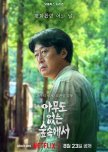
This review may contain spoilers
If you fall asleep while watching the drama, and no eyes are opened to see it, is the drama good?
We get it, Na Hong Jin's The Wailing (2016) is great! But that does not mean replicating its structure will yield the same results. Similar to that of the infamous double ritual scene in The Wailing, The Frog films two events occuring in separate timelines simultaneously, and uses editing to try to trick viewers from interpreting what is happening in the story. It is only until much later into the episode where the disjointed timeline is revealed and attentive viewers begin to get an idea of what had happened. However, unlike The Wailing whose tricky editing served a thematic purpose, The Frog presents no reasoning for its editing choice except to test the viewer's patience. Also coincidentally, both productions happen to tackle the problem of random evil. But the stark contrast of how the subject matter was handled between the two is clear once again. While The Wailing ventures on an ambitious aim of understanding the why, utilizing the director's personal wrestlings of his faith as a keystone for shaping the plot, The Frog gives a muted showcasing of the damages done by evil without much reflection except to maybe criticize a lack of empathy for strangers. The execution between the two is akin to a gymnast gracefully landing a complex somersault and a frog leaping and falling flat on its belly. The Frog's performance is not the prettiest nor very thoughtful, but at least there was an attempt.The series traces the timelines of two different lodging owners, Sang Jun, a motel owner, and Young Ha, a guest house owner. Both are victims of collateral damage by problematic renters, Hyang Cheol, a serial killer, and Seong Ah, a murderous squatter. Their narratives unfold nonlinearly, twenty years apart. In Sang Jun's case, a serial killer dismembers a body, for unknown reasons, in one of the rooms with a lake side view, which drives away business once the incident garners media attention. After a year, the motel owner goes bankrupt and is left with a broken family. Twenty years later in another remote corner of the same town, Young Ha deduces a woman has killed her stepson in the guest house. But to preserve the sanctity of his wife's final resting place and to avoid trouble involving a stranger, the pension house owner buries the truth. A year later, the same woman returns and tries to purchase the house.
Swarms of flashing lights and camera lens fill the air as media teams bombard a motel. We are at Lake Side View motel where Sang Jun frantically arrives to the scene oblivious of what has happened. A detective at the scene briefs him that one of his tenants is serial killer Ji Hyang Cheol, and the killer had dismembered a woman in one of the rooms. The devestated and terrified owner makes his way to the second floor room and uncovers the grisly truth. As if the traumatic event wasn't enough, Sang Jun soon realizes the greatest threat of Lake Side View motel that day wasn't the serial killer who was swiftly captured by police, but the hounding news anchors and reporters that covered the story without consideration for his circumstances.
For casual viewers, the scene of a media storm is not unordinary, but those who kept up with Korean entertainment news can link the event with the suicide of Lee Sun Kyun, a popular actor known for his unique voice. The coverage of his scandal was widespread and nonstop. Naturally, the climate was ripe for various rumors and unsupported allegations to spread among laypeople and professionals alike. It was only after his death when many people began to find the police, which leaked information, and the media, which relied less on the quality of the information but the quantity and quickness of their coverage, culpable. So, it should not color anyone surprised that a Netflix series attempts to capitalize on an infamous tragedy to function as a social commentary in the most careless and caricature-like manner, not even a year after his passing.
There is another frantic owner. But Young Ha has a good idea of what transpired inside the guest house and has the opportunity to correct an evil. He chooses not to. Instead, the bloodied crime scene with a corpse of a child is washed by his sweat, as the pension house owner ensures if Seong Ah, who casually cleaned the room in a hurry, left any lingering evidence, then he'll be the one to thoroughly erase it. Yet, similar to the reporters who had forgetten about and ignored Sang Jun's circumstances when covering his story, the writer ironically also forgets about Young Ha's situation while rushing to the next part of the story.
The Frog lazily puts both business owners, Young Ha and Sang Jun, adjacently together and parallel their misfortunes as one of the same. Yet, with a moment of reflection, it should be clear the pension owner's justification for not reporting the crime becomes flimsy when we consider:
I. Young Ha, whose daughter and son-in-law are willing to set up the house as a vacation house instead, is wealthy; Sang Jun invested his last cent into buying the motel and was penniless.
II. Seong Ah takes the corpse with her and cleans the crime scene; Hyang Cheol did not and left the dismembered body parts on the motel bedroom.
Any notions of an intrusive media or crime scene investigation team that affected the motel owner and his motel would not apply to the pension house. If Young Ha immediately reported the incident, most of the manpower would have been spent chasing Seong Ah down. A few forensics people may double check the guest house to see if there are any lingering evidence left, but they will not flip the whole place upside down as they did for the motel. In the absolute worst case scenario where information is leaked to the media, Young Ha can simply turn his pension house into a vacation home. Then, maybe the justitication for Young Ha's noninterference really boils down to a selfish businessman who did not want to involve his hands in the "meager death" of a stranger's child after all.
In a distant morning, Young Ha prepares the guest house rooms and the dinner ingredients for a scheduled family gathering. Out of the blue, Seong Ah returns in such a perfectly cliché fashion that calling it "cliché" wouldn't do it justice. After all, what kind of series sets up an entire episode for a cliché? The Frog did. Instead of creating a normal person who either keeps incriminating evidence for safe measure or discards them entirely to avoid trouble for possessing something he shouldn't, the brilliant writer opts for Young Ha to keep half-incriminating evidence. That is, he keeps the dashcam footage history, which means he'll be jeopardizing his life by holding onto the evidence, but he cleans the bloodied record, which was the other half of the evidence necessary to bring about reasonable suspicion. However, the nonsensical decision-making was perfectly orchestrated as it is crucial in enabling Young Ha to be stuck with Seong Ah. This is because if Young Ha possessed both pieces of evidence, a quick sucker punch to Seong Ah's face upon her unwelcomed appearance, would be the impetus to stun, restrain, and call the cops on her. In his current state, the pension house owner cannot do that because the recording, by itself, is insufficient evidence. Instead, he and Seong Ah must now apparently live together.
But, the whole purpose for a half-incriminating evidence, rather than no evidence at all, is to prepare ANOTHER cliché that occurs when our soft-hearted, child-murder witness has change of heart. Similar to married couples past their honeymoon phase, Young Ha cannot fathom living beside his newly acquired neighbor, which probably has something to do with her stuffing a dismembered child into a suitcase. However, Young Ha currently only has half the evidence for reasonable suspicion since he discarded the other half, so how can he compile enough evidence that goes beyond a reasonable doubt? A voice recorder will do! Now after he records Seong Ah's confession, he can simply drive off into the sunset as he presents the police his undeniable evidence. Nope. In predictable fashion, not only does the psycho woman conveniently spot the recorder box, she finds Young Ha right as he pulls up to the police station, floors the gas pedal and T-bone collides the poor man's car in broad daylight for every eyewitness to see. Is this disappointing or actually impressive stuff? We're talking linking clichés due to a single action the character made. Talk about making the most of something, even if none of the characters make sensible decisions.
That question is quickly put to rest in the following scene. We see a bloodied Young Ha in a wrecked car and Seong Ha with a mean glare casually approaching him. His car is bellowing with smoke while he is losing consciousness. Cops are running over to rescue the owner. Everyone saw what had happened. So, all the cops need to do is place Seong Ah under arrest for attempted murder, or at least, reckless endangerment, right? Just as viewers eagerly await for Justice to be served on an ice-cold platter, the writer jumps out of the screen and whispers into our ears, "Did anyone ACTUALLY see what happened?" And just like that, the attempted murder becomes nothing but wistful, evaporating memories. When viewers awake from their hypnotic slumber, like Kevin Spacey in The Usual Suspects, we are convinced the accident never existed. Young Ha and Seong Ah also go back to being neighborly housemates. Then, some time later, a douchebag cop loverboy appears. He dies. Once again, no one gives a hoot about his going missing until his body is found after the entire ordeal is over. I guess people's lack of consideration for his disappearance is once again chalked up to "he was on vacation."
Finally, the two timelines converge into one, but the timelines are not the only thing that changes. There is an abrupt and drastic tonal shift where the series morphs into some Jason Bourne meets Terminator action flick, losing all the artificial tension that the first half laboriously spent attempting to build up. Instead, that tension is quickly replaced with more clichés, logical gaps, and half-assed writing:
A man carries a rifle into a hosptial filled with people, shoots another man, leaps out of the window of the several story building suffering from minor injury, and limps away. Authority figures practically do not exist and wend along the sidelines unless we conveniently need them to clean up the messy story at the end (or to resummarize the drama). Safety concerns? What are those? The characters line up in a single line like sheeps to a slaughterhouse to directly confront a madwoman. But actually, it turns out Seong Ah is physically weak! Oh wait, but it also turns out the other characters lack brain cells! A car comes crashing through the side of art gallery leading to massive destruction of property and endangerment of people's lives? No problem, money will resolve that. Because we all know rich people are above the law and escape their openly criminal behavior.
After going through various cumbersome shenanigans, it is time for The Frog to come to a close and unveil the truth. We face both killers separately: Hyang Cheol in his visiting cell; Seong Ah at gun point by her ex-husband who is justifiably pissed that his child got murdered by the psychotic stepmom. And when both killers are supposed to explain the BIG why: Why did we have to sit through those mindless and droning action sequences? Why did either killers carelessly go to vacation houses to perform their deed instead of, you know, just doing normal serial killer business, such as kidnapping hitchhikers at night, burying their body in an obscure location, and avoiding eyewitnesses? Since even riding a big white van that reads "I'm not a creep" while offering spiked candy to men, women, and children alike would have probably been a better methodology of remaining uncaught than what had actually transpired in the rental rooms. So, what started all this nonsense? Both their responses were essentially, "Meh, because I felt like it in the heat of the moment."
What the fu--
Ribbit... Ribbit... Ribbit...
Then, the brilliance of the writer hits us like the rays of Heaven:
A FROG DIES FROM A STONE THROWN INADVERTENTLY
The mumbo jumbo yapanese by the killers is to connect it to the frog idiom: the killers are the stone tossers randomly chucking their rocks; the business owners are the poor frogs! They say.
Of course, it all makes sense; duh, it was all because of the frogs; this writer is a genius! They say.
If there is one thing The Frog succeed in, it is the prototypical example of consumerist culture gone haywire. The art of screenplay and directing has become formulaic cookie-cutters, a pastiche of previous hits but devoid of an authentic voice or identity, relying on subterfuge and dynamic action sequences to compensate for its lack of depth and creativity. Any semblance of a "voice" is to pitch a tame, yet spineless position that matches the zeitgeist. The ultra-rich are evil! Everyone in Korea was unilaterally outraged by media encroachment, so I should write about that in a comically obvious way! But I should also add some conventional wisdom such as a frog idiom to give the series some narrative depth! In the mean time, the characters can forcefully draw out the connection with their awkward dialogue...
The Frog is symbolic. It is a frog inflating its throat, a generic, empty piece of entertainment with captivating images, that tries to croak deeper than its previous, but is caught unawares when people eventually find it annoying. If anything, The Frog represents enough time has passed for commodified art forms to have become commonplace and consumers no longer seek authentic, well crafted stories as long as they receive their dopamine kick. With its positive reception marks another sad victory for the mega-factory churning, AI generated future that algorithmically deconstruct and reconstruct human effort instantaneously for quick consumption: a superficial and soulless tomorrow.
Was this review helpful to you?
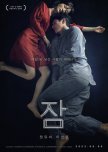
This review may contain spoilers
Dull Writing and Insane Characters
While there are some Horror movies that have alluded to various religions, and have done them successfully, "Sleep" seems to presume the audience is already familiar and sympathetic with Shamanism and Buddhism, including their esoteric rituals and practices without any justification or explanation. As a result, those unfamiliar with these practices will find the character's behavior off-putting and their responses bizarre. For example, in one instance, the priestess starts ringing her bell loudly to deter the supposed demon possessing the husband. However, she approaches the baby and starts to violently ring a bell against the infant's ears causing it to wail. Both the ML and FL, who are apparently skeptics at this point, don't consider at any point to perhaps engage this shenanigan without the baby? Rather, the delirious and sleep deprived FL becomes more and more convinced by the shaman's antics, while the ML gets slightly agitated and shields the baby, but does not assume that the unruly practice might either traumatize or harm it. At this point, the realism of the story is lost for me because none characters are acting as how normal people and purported skeptics would: bothered and protective.When we get to final segment of the movie, there is an interesting dilemma of whether the female protagonist is suffering from paranoia or whether her husband is genuinely possessed. While interesting, it was, unfortunately, poorly executed. To shock viewers of the wife's lunacy, the perspective is shifted from the wife's to the husband's. Then, we find out to convince the demon to leave, the female protagonist not only kills the neighbor's dog, but kidnaps the neighbor and threatens to drill a hole in the neighbor's skull. What is the neighbor's response to all these violent acts against her? That the demon should stop possessing the husband... Initially, I thought, perhaps the neighbor was simply pretending to go along with the protagonist's hysteria to preserve her own life. But then, the neighbor begins to converse with the husband as if he were really her dad, begs him to leave, and promises she would perform ancestral rites for him. There is not a single indication that the neighbor is performing an act, but rather we see both the neighbor and the protagonist believing the husband is possessed, insistent, and seemingly justifying FL's previously fanatic behavior to expunge the demon.
For any rational person, whether religious or not, this is incredibly abnormal behavior and dialogue. Suppose you were a devout Jew, Christian, Muslim, Buddhist, Hindu, etc. and someone kidnapped you because the kidnapper believed your parent's spirit/demon was haunting her or her family member. Wouldn't the initial reaction always be: This person is insane; please stop her? Wouldn't you try to reason with the kidnapper when given the opportunity to? Apparently, not in this movie. And without surprise, it turns out the husband was actually possessed..! The spirit of the father leaves (and mind you, we are still in husband's or 3rd party POV and no longer the wife's) and thus, the implied message in the ending is: everything was justified and peace has returned... Yikes.
There are other unconvincing behaviors in the movie as well, such as the wife's wanting to ignore and put up with her husband's strangeness because of an arbitrary signpost that he crafted: "Together, we can overcome everything!" Ah yes, that's why I should allow my husband near my baby even though he accidentally killed my fur-baby because, apparently, we can overcome this situation together by jeopardizing my baby's life? No pain, no gain; no risk, no reward! I genuinely don't understand what sort of rationale, if any, was in this writer's mind when creating this nonsense.
It's a shame too because I think the movie would had a lot more potential if it went with a psychological than a supernatural direction, or if it was not written by a religious extremist, since the possibility that the husband acted as a demon (for he is an actor, though merely an extra) in the end could have been a perfectly tenable theory a la Witness for the Prosecution. That is, until it is squandered by every other character's reaction, the very improbable or impossible "coincidences" in the movie, and the lazy POV change at the end.
All in all, the writing is mediocre, the story was decent, and the acting was great. It had its thrilling moments and is a fun movie, but it is far from outstanding.
Was this review helpful to you?
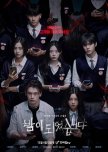
This review may contain spoilers
Inconsistent.
The appeal of the show is that it's a deductive mystery. Mafia is essentially a whodunit mystery. The mystery should be the primary focus and the high school drama and romance should be secondary. After all, that is how the show was marketed.However, after the male protagonist is killed off by a nervous lynch, to preserve the romance, the writers revive him. But by doing so, the dynamics of the game changes drastically. The announcer conveniently no longer announces the roles of those who are killed, the doctor can revive anyone even if they weren't killed in the Night, and the viewers no longer face the thrill of danger for the protagonists because we now know the writers will simply bring them back to life. This show, in a single moment, destroyed the sanctity of all its genre. It is a mystery that has lost its logical credibility, a horror and thriller without a genuine threat of death, a high school romance that isn't quite romantic, and a high school drama with unreasonable stakes—where trivial conflicts lead to death and murder.
Was this review helpful to you?
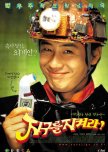
Crazy Delight
Rewatching this gem after so many years, I am quite surprised how little recogniton this film has even among Korean film enthusiasts. There are fans who know all the main directors and love to watch arthouse directors, such as Hong Sang Soo, but whenever I ask them have you seen "Save the Green Planet?" I'm often met with a perplexed look: "What's that?"Save the Green Planet!, Jang Joon Hwan's feature-length debut film, is a sci-fi, comedy, psychological thriller. Yes, somehow Jang Joon Hwan also manages to masterfully weave the disparate genres all on his debut! The film is told from the perspective of Byeong Gu, a secluded beekeeper living in an isolated house on top of a mountain. This house, however, is no ordinary house; it was rebuilt over an abandoned mannequin factory allowing for a labyrinthian underground palace with various elaborate makeshift devices and traps. Byeong Gu is also no ordinary man. He is a delusional conspiracy theorist who is convinced that the CEO of a pharmaceuticals company is in fact an alien overlord. Sheer madness and hilarity ensues when Byeong Gu kidnaps and traps the CEO under his house. Byeong Gu attempts to torture the truth out of the CEO, while he goes on with his ordinary day-to-day activities, while avoiding the attention of authorities, and all while treading the thin line of sanity and insanity, if he hasn't already fallen over that is.
What I most appreciated about the film is how Jang Joon Hwan subverts the traditional hero's journey and what we have instead is a very confused and pitiful villain against an asshole victim. Our morals are constantly tested, the legal procedure is flipped, and just as we are complicit in Byeong Gu's devious acts, we also end up a little bit insane with him. The film ossicilates between the different genres quite naturally. It has moments of absurdity with surrealistic elements, but Jang Joon Hwan doesn't use the surreal as a cheap tool to lose the logical coherence of the film as most surrealist comedies do. Rather, it is a tool used to create or alleviate tension and self doubt. For maximal enjoyment of the film, I recommend not to view the film as morally prescriptive, but rather examine how Jang Joon Hwan plays around with various tropes and conventions.
Unfortunately, after Save the Green Planet's box-office flop, Jang Joon Hwan must await nearly a decade for another attempt at feature-length film. But by then, the damage is done; the creativity and ambitions of Save the Green Planet! is long gone and what's left is caged bird: the conventions that Jang Joon Hwan attempted to overcome becomes his shackles.
Was this review helpful to you?
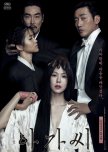
Frustrating
The recipe for this film: induce random conflicts for the sole purpose to set up meaningless plot twist after plot twist, a sprinkle of symbolism here and there, various graphic acts with a touch of unusual characters in equally bizarre costumes, and all neatly packaged with a final comical, voyeuristic homoerotic act.With some reflection, it is clear to us that each ingredient was tactfully manufactured to artificially arouse the audience with shock value. And perhaps it is only these scenes, and not the story as a whole, that the audience will remember. Yet, keener eyes will not succumb to such parlor tricks. Despite the tight script, the screenplay itself was contrived and unnatural. The movie was a boisterous performance to posturize Park's chops as an experienced director and a film enthusiast, but not as a storyteller. The film had every element of becoming great story but resorts to tawdry gimmicks. All in all, The Handmaiden, although technically better filmed, is a far cry from Park Chan Wook's earlier notable works, which seamlessly showed originality and a honest exploration of life's gravitas.
Was this review helpful to you?

Social Commentary or Mental Health?
If you want a drama to accurately represent and inform viewers about mental illness, then this is not for you. If you want reasonable characters and complex dialogue, then this is not for you. If you want mature characters who are expected to act their age, then this is not for you. If you enjoy a watered-down and amateur screenplay about human interactions that also deals with mental issues, and tries to hide its flaws with pretentious moralizing, occasional comic relief, and a flurry of needless romance, then this is right up your alley!Although the shows has a stellar start with interesting safety facts and quirks about working in a psychiatric facility, that is about the extent of where the facts regarding mental illness are informative. At one instance, the show briefly mentions the scientific and physical (neurochemical/anatomical) explanations for mental illnesses, but very soon after, it completely dispels or forgets the physical and tries to mainly attribute the cause to societal pressures and injustices. In other words, it is the overbearing mother, the despotic manager, or the predatory capitalistic society that is causing our mental health crisis. And the universal remedy is that people just need to take their meds and have others accept them; or, for those suffering from severe OCD, fall in love and be cured! This is a completely naive picture that an introductory course in psychiatry will quickly dispel. To make matters worse, the "prescriptions" aren't scientifically backed advice but are seemingly a mixture of the writer's dogmatisms, sociological assumptions, and attempts at psychoanalysis. The patients become the victims of the overused trope: "society is the problem." Therefore, society must change; not the patients. Once their external environment changes, the patients, too, will magically begin to improve. Quite ironically, like the situation with the overbearing mother, the drama reeks of victim mentality and a denial of the victim's actual condition.
What this drama portrays for the "mentally ill" are those who have had their worldviews, ambitions, goals, and desires destroyed by societal pressures. Then, it throws in various mental illnesses ad-hoc. These situations may describe some cases, as traumatic experiences can trigger underlying issues or make one more susceptible to developing underlying conditions, but the environment is rarely the cause. The environment does not force your physical make-up to change and leave you in an inelastic, neurochemically impaired state which is predominantly the situation for patients who require long term stays at a psychiatric ward. The mentally ill aren't exclusive to members of society who have had difficult and restricted lives or those who have failed at their chances for glory. They exist for all types of people and can happen to anyone, anytime: with or without reason, poor or rich, successful or unsuccessful, sociable or reclusive, physically fit or unfit, etc. Like, seriously. What will the writer claim was the catalyst for John Nash's schizophrenia and psychosis? Too much success? For possessing too much mathematical prowess? Or, Robin William's depression? Too great of a comedian? For possessing too much fame and wit?
Beside the mental illness stuff, the drama is quite over-the-top and immature; it constantly establishes a sense of brooding for rather very shallow perspectives. The first 2 episodes seem to set the tone for the remainder of the drama, so if that's your cup of tea then go for it. It clearly wasn't mine which is why I had to drop.
Was this review helpful to you?

This review may contain spoilers
Existentialism Gone Amok.
The drama portrays interesting apocalyptic scenarios, using philosophical undertones to convey its point.We can see appropriate criticisms against the religious zealots and the tyrannical priest class abusing its authority to gain control over the mass, a retelling of Nietzsche's biting critique on religion. We also receive a neat existentialist prescription: Don't rely on authority, rely on yourself and empiricism. Face the helms of danger with courage. Settle matters with your own choice and self-governance! Sounds great on paper. The issue?
None of the existentialist philosophers who encouraged us to think for ourselves encountered a supernatural floating head that damned people to Hell nor bootleg grey Hulks eradicating people left and right. All of them presupposed that God did not exist, so the natural recourse is to take matters into our own hands. Although a slight distinction, that slight distinction makes for a understandable and reasonable argument into one that is completely untenable. In other words, the drama conveys the most radical idea: Even if God or supernatural beings exist and gave us presumably divine commands, we say fuck it and take matters into our own hands and how we see fit.
The antidote against an unstoppable supernatural force is cute, but flimsy. It is as if we encountered an encroaching catastrophic tsunami with nowhere to hide, and the writer confidently assures us we need to face it directly for it is our only option. Fueled by his inspiring words, we brace ourselves and await the tidal behemoth. Any sensible person running away from the crashing waves dies and perishes. However, we, until the brink of death, face forward and are rewarded as a portion of the tide splits and passes right by us. We remain undamaged for we did not despair! Just as the writer said, we decided and accomplished our goal. The great irony? We relied on a divine force of the writer to part the seas to save ourselves from this dilemma despite our proclamation to overcome the situation by ourselves.
Similarly, despite the cute prescription of the show, the characters rely on Deus ex machina to rescue them. The protagonists mindlessly retort their individualistic beliefs, yet escape their perilous circumstances with the writer's convenient interventions; a direct contradiction of the confused theme declared by the drama.
Was this review helpful to you?

 1
1


